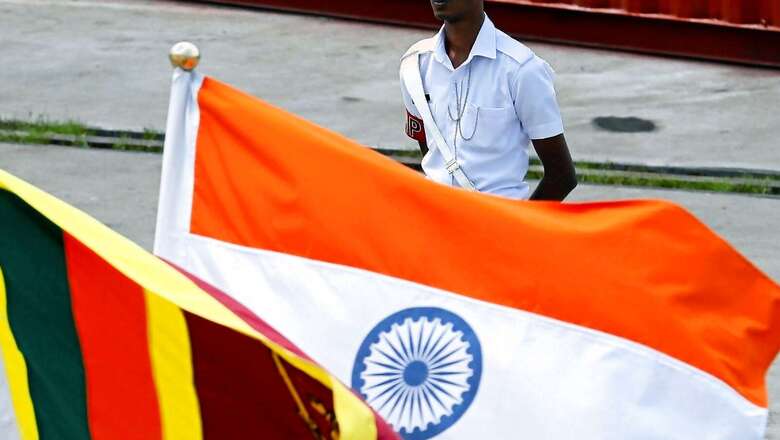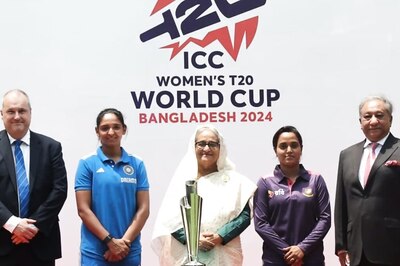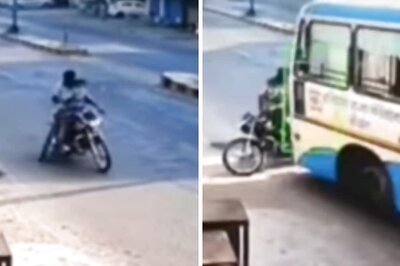
views
After extensive talks with Indian Foreign Secretary Harsh Vardhan Shringla in Colombo, Foreign Minister G.L. Peiris acknowledged that the two sides discussed future cooperation in developing the two oil tank farms of Second World War vintage in the eastern port town of Trincomalee. Finance Minister Basil Rajapaksa, one of the brothers forming the ruling quartet in Sri Lanka who discussed bilateral economic issues with Shringla, has been quoted saying that elections to the nine Provincial Councils (PC), delayed by the predecessor government, would be held in the first quarter of 2022.
These were two of the main publicised points that Secretary Shringla had flagged in his discussions with the hosts, which otherwise included President Gotabaya Rajapaksa, Prime Minister Mahinda Rajapaksa, and his counterpart, Adm. Jayanth Colombage (retd). If the two sides had discussed Sri Lanka’s continuing food-and-forex crises, official statements and newspaper reports did not mention them. Earlier reports had indicated that Shringla’s visit was supposed to have been flagged over the twin issues, after Peiris met his Indian counterpart, S. Jaishankar, on the sidelines of the United Nations General Assembly (UNGA) only weeks earlier.
ALSO READ | How India Lost Sri Lanka to China—Starting with Strategic Blunders during Indira Gandhi Regime
Two-fold Message
The bottom line of the Indian statement was two-fold: One, Colombo needed to walk the talk on all promises made to New Delhi and the local constituencies, on multiple issues. At the top of the latter’s concern is a political solution to the ethnic issue that has evaded solution even after a decade since the end of the LTTE war. India’s reference to early PC polls is contextualised to this.
New Delhi, as the initiator of the 13th Amendment (13-A) to the Sri Lankan Constitution back in 1987, feels that successive governments in Colombo have not kept the national commitment, whatever be their ideological pedigree and political pre-suppositions. Post-war, the then government of the Rajapaksas continued with their half-hearted attempts, despite wholesale rejection by the Tamil voters.
Now the Rajapaksas are back in power, for at least five years from late 2019. In a significant observation reportedly made to Secretary Shringla, President Gotabaya reportedly underscored the ‘urgent need to understand the weaknesses as well as the strengths’ of 13-A. This is a welcome departure from possible prompted positions earlier taken by some of his chosen Cabinet colleagues on scrapping 13-A. Internal Security Minister Rear-Adm Sarath Weerasekara (retd), however, modified his tough position to ‘clarify’ that ‘negative clauses in 13-A will be scrapped’. He did not elaborate any further.
Impossible Task
According to reports, Secretary Shringla suggested to a delegation of Tamil National Alliance (TNA) that met him in Colombo, for all Tamils to stay united first. This message, he is believed to have conveyed also to his dinner guests in the Tamil-majority Northern Province capital of Jaffna. Some of the non-TNA Tamil leaders listed out more of the denials under the Gotabaya regime.
Within moderate sections of the Tamil community and polity that do not aspire for a ‘separate homeland’, too, there is little acknowledgement that if the war-victorious Rajapaksas could not carry the substantial ‘Sinhala-Buddhist nationalist’ constituency, then no other political party or leader in power could be able to do so in the foreseeable future. In real terms, ‘Tamil unity’ too is becoming an increasingly impossible task with each passing day.
Double Standards
The second broad-spectrum idea that Secretary Shringla seemed to have covered with the Colombo leadership relates to continued Indian concerns on Sri Lanka’s double standards; for instance, when it came to project clearances vis-á-vis those initiated by China. The most recent publicised issue pertained to the tri-nation East Container Terminal (ECT) project in Colombo Port, also involving Japan, which the Gotabaya regime cancelled, in October last year. This was long after the previous Sirisena-Wickremesinghe government had signed an MoU.
The Trinco oil tank farms also fall into this category as trade unions had come out against extending the 35-year lease with public sector Indian Oil Corporation (IOC). The lease was a belated outcome of an Annexure to the Indo-Lanka Accord of 1987, aimed at ensuring that Sri Lankan territory did not fall into the hands of ‘anti-India’ powers. While President Gotabaya has directed Petroleum Minister Udaya Gammanpila to work out the modalities, identifying a cost-effective project for joint development of the tank farms is challenging, given the age and capacity of the tanks. Or so it seems.
ALSO READ | Sri Lanka is looking to Reset Ties with India, Bridge the ‘Trust Deficit’
The Indian pique over inequitable treatment on development funding has been accentuated in recent years, especially after adversarial China got an unacceptable Hambantota construction-cum-concession contract under the previous Rajapaksa regime (2005-15), which was converted into a 99-year-lease, when the rival Sirisena-Wickremesinghe duo was in office (2015-19). It had begun with a free hand for China in the Norochcholai coal-based power project and the then Mahinda Rajapaksa government dragging its feet on a proposal for India to develop one in eastern Sampur, citing delays that were at best political excuses.
The joint decision to drop the Sampur project, given the ever-increasing global concern over coal-fired units, alone ended what promised to be a classic bilateral controversy of the ECT kind. Yet, there is no mention any more about an alternative oil-fired power project in an alternative site, after Tamil residents objected to the Sri Lankan government’s original choice as being ‘destructive’.
Likewise, there is also no mention of the much-publicised India-driven pharma Special Economic Zone in the Trincomalee belt, as agreed upon during a high-profile visit of then Chemicals Minister, Anand Sharma, from India. That the anti-Rajapaksa predecessor regime too did not follow up on the project, as with power-devolution and the unilateral promise to cancel the Mahinda government’s Memorandum of Understanding on Colombo Port City, has been an added cause for Indian concern.
All of it has shown that notwithstanding whichever Sinhala-Buddhist political party or leader is in power in Colombo, issues of Indian concern, be it on the ethnic issue or on the bilateral front, have not been handled honourably and honestly. This attitude of successive Sri Lankan governments has led India to conclude that Colombo was ‘shifting the goal-posts’ all the time, a sentiment since concretised by the West through the UNHRC resolutions, at least on ‘accountability issues’, if not the larger ethnic issue.
Security Concern
According to the President’s Media Division (PMD), Gotabaya reiterated the Sri Lankan commitment ‘not to allow the use of its territory in any way that threatened India’s security’. He also detailed the nation’s relationship with China, the statement said without elaborating. It is not unlikely that the President reiterated that Sri Lanka’s China relationship was only development-oriented and economic in content.
Apart from the China angle, there are security issues of mutual concern. The possibility of a re-Talibanised Afghanistan inspiring Islamic terror groups in the two countries, including the muddying of shared Indian Ocean waters, cannot be ignored now. The arrest of ex-LTTE elements involved in large-scale drugs smuggling, and seizure of weapons and ammunition by the Indian Coast Guard in mid-sea in March can be overlooked only at the cost of shared peril.
Linked to the latter is the ‘China bogey’ that Sri Lankan Tamil Diaspora groups have begun flagging, targeting India, especially through friendly political voices in southern Tamil Nadu, which, however, are muted at present. Anticipating possibilities of trouble, especially in the light of the recent arrest of an LTTE intelligence operative, Tamil Nadu police have begun internal discussions and consultations to confront them before they raise their ugly heads again.
In this background, the two navies discussed the use of fishing vessels for drugs and contraband-smuggling at the bi-annual meeting, usually held at the International Maritime Boundary Line (IMBL) but became an online affair owing to COVID-19 pandemic. As coincidence would have it, the two armies commenced a 12-day counter-terrorism exercise at Sri Lanka’s Combat Training School in eastern Ampara on the day Secretary Shringla met President Gotabaya.
These are all part of the upgraded three-nation agreement on maritime and the larger security affairs, including Maldives, signed by their National Security Advisors (NSA) at Colombo in November last year. And outside of the agreement too, as continuing bilateral arrangements. While for long, such operational understanding has existed at the level of the three services in the two countries, it is the political and bureaucratic leaderships at Colombo that have to instill and inject a greater degree of mutual trust, which is still lacking—when it comes to China. And that is the core message that Secretary Shringla seems to have carried to Colombo, and yet again, as every Indian interlocutor before him, in a long time.
This article was first published on ORF.
The writer is Distinguished Fellow, Observer Research Foundation-Chennai Initiative. The views expressed in this article are those of the author and do not represent the stand of this publication.
Read all the Latest News , Breaking News and IPL 2022 Live Updates here.

















Comments
0 comment